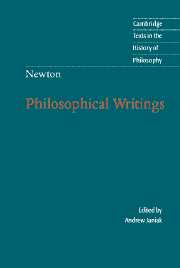Book contents
- Frontmatter
- Contents
- Acknowledgments
- Introduction
- Chronology
- Further reading
- Note on texts and translations
- I Correspondence with Robert Boyle [1679]
- II De Gravitatione [probably before 1685]
- III The Principia [1687, first edition]
- IV Correspondence with Richard Bentley [1692–3]
- V Correspondence with Leibniz [1693 and 1712]
- VI Correspondence with Roger Cotes [1713]
- VII An Account of the Book Entitled Commercium Epistolicum [1715]
- VIII Queries to the Opticks [1721]
- Index
- CAMBRIDGE TEXTS IN THE HISTORY OF PHILOSOPHY
IV - Correspondence with Richard Bentley [1692–3]
Published online by Cambridge University Press: 05 June 2012
- Frontmatter
- Contents
- Acknowledgments
- Introduction
- Chronology
- Further reading
- Note on texts and translations
- I Correspondence with Robert Boyle [1679]
- II De Gravitatione [probably before 1685]
- III The Principia [1687, first edition]
- IV Correspondence with Richard Bentley [1692–3]
- V Correspondence with Leibniz [1693 and 1712]
- VI Correspondence with Roger Cotes [1713]
- VII An Account of the Book Entitled Commercium Epistolicum [1715]
- VIII Queries to the Opticks [1721]
- Index
- CAMBRIDGE TEXTS IN THE HISTORY OF PHILOSOPHY
Summary
LETTER ONE
Cambridge, 10 December 1692
To the Reverend Dr Richard Bentley, at the Bishop of Worcester's House in Parkstreet, Westminster.
SIR,
WHEN I wrote my treatise about our system, I had an eye upon such principles as might work with considering men, for the belief of a deity, and nothing can rejoice me more than to find it useful for that purpose. But if I have done the public any service this way, it is due to nothing but industry and patient thought.
As to your first query, it seems to me that if the matter of our sun and planets, and all the matter of the universe, were evenly scattered throughout all the heavens, and every particle had an innate gravity towards all the rest, and the whole space, throughout which this matter was scattered, was but finite; the matter on the outside of this space would by its gravity tend towards all the matter on the inside, and by consequence fall down into the middle of the whole space, and there compose one great spherical mass. But if the matter was evenly dispersed throughout an infinite space, it would never convene into one mass, but some of it would convene into one mass and some into another, so as to make an infinite number of great masses, scattered at great distances from one to another throughout all that infinite space. And thus might the sun and fixed stars be formed, supposing the matter were of a lucid nature.
- Type
- Chapter
- Information
- Isaac Newton: Philosophical Writings , pp. 94 - 105Publisher: Cambridge University PressPrint publication year: 2004
- 1
- Cited by



